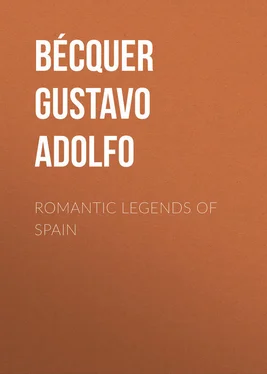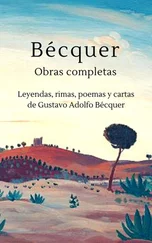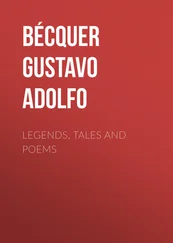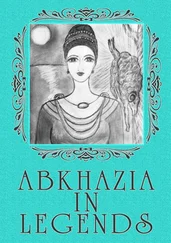Gustavo Bécquer - Romantic legends of Spain
Здесь есть возможность читать онлайн «Gustavo Bécquer - Romantic legends of Spain» — ознакомительный отрывок электронной книги совершенно бесплатно, а после прочтения отрывка купить полную версию. В некоторых случаях можно слушать аудио, скачать через торрент в формате fb2 и присутствует краткое содержание. Жанр: foreign_antique, foreign_prose, на английском языке. Описание произведения, (предисловие) а так же отзывы посетителей доступны на портале библиотеки ЛибКат.
- Название:Romantic legends of Spain
- Автор:
- Жанр:
- Год:неизвестен
- ISBN:нет данных
- Рейтинг книги:4 / 5. Голосов: 1
-
Избранное:Добавить в избранное
- Отзывы:
-
Ваша оценка:
- 80
- 1
- 2
- 3
- 4
- 5
Romantic legends of Spain: краткое содержание, описание и аннотация
Предлагаем к чтению аннотацию, описание, краткое содержание или предисловие (зависит от того, что написал сам автор книги «Romantic legends of Spain»). Если вы не нашли необходимую информацию о книге — напишите в комментариях, мы постараемся отыскать её.
Romantic legends of Spain — читать онлайн ознакомительный отрывок
Ниже представлен текст книги, разбитый по страницам. Система сохранения места последней прочитанной страницы, позволяет с удобством читать онлайн бесплатно книгу «Romantic legends of Spain», без необходимости каждый раз заново искать на чём Вы остановились. Поставьте закладку, и сможете в любой момент перейти на страницу, на которой закончили чтение.
Интервал:
Закладка:
It was night, a summer night, mild, full of perfumes and peaceful sounds, and with a moon, white and serene, high in the blue, luminous, transparent heavens.
Manrico, his imagination seized by a poetic frenzy, after crossing the bridge from which he contemplated for a moment the dark silhouette of the city outlined against the background of some pale, soft clouds massed on the horizon, plunged into the deserted ruins of the Templars.
It was midnight. The moon, which had been slowly rising, was now at the zenith, when, on entering a dusky avenue that led from the demolished cloister to the bank of the Douro, Manrico uttered a low, stifled cry, strangely compounded of surprise, fear and joy.
In the depths of the dusky avenue he had seen moving something white, which shimmered a moment and then vanished in the darkness, the trailing robe of a woman, of a woman who had crossed the path and disappeared amid the foliage at the very instant when the mad dreamer of absurd, impossible dreams penetrated into the gardens.
An unknown woman! – In this place! – At this hour! “This, this is the woman of my quest,” exclaimed Manrico, and he darted forward in pursuit, swift as an arrow.
He reached the spot where he had seen the mysterious woman disappear in the thick tangle of the branches. She had gone. Whither? Afar, very far, he thought he descried, among the crowding trunks of the trees, something like a shining, or a white, moving form. “It is she, it is she, who has wings on her feet and flees like a shadow!” he said, and rushed on in his search, parting with his hands the network of ivy which was spread like a tapestry from poplar to poplar. By breaking through brambles and parasitical growths, he made his way to a sort of platform on which the moonlight dazzled. – Nobody! – “Ah, but by this path, but by this she slips away!” he then exclaimed. “I hear her footsteps on the dry leaves, and the rustle of her dress as it sweeps over the ground and brushes against the shrubs.” And he ran, – ran like a madman, hither and thither, and did not find her. “But still comes the sound of her footfalls,” he murmured again. “I think she spoke; beyond a doubt, she spoke. The wind which sighs among the branches, the leaves which seem to be praying in low voices, prevented my hearing what she said, but beyond a doubt she fleets by yonder path; she spoke, she spoke. In what language? I know not, but it is a foreign speech.” And again he ran onward in pursuit, sometimes thinking he saw her, sometimes that he heard her; now noticing that the branches, among which she had disappeared, were still in motion; now imagining that he distinguished in the sand the prints of her little feet; again firmly persuaded that a special fragrance which crossed the air from time to time was an aroma belonging to that woman who was making sport of him, taking pleasure in eluding him among these intricate growths of briers and brambles. Vain attempt!
He wandered some hours from one spot to another, beside himself, now pausing to listen, now gliding with the utmost precaution over the herbage, now in frantic and desperate race.
Pushing on, pushing on through the immense gardens which bordered the river, he came at last to the foot of the cliff on which rises the hermitage of San Saturio. “Perhaps from this height I can get my bearings for pursuing my search across this confused labyrinth,” he exclaimed, climbing from rock to rock with the aid of his dagger.
He reached the summit whence may be seen the city in the distance and, curving at his feet, a great part of the Douro, compelling its dark, impetuous stream onward through the winding banks that imprison it.
Manrico, once on the top of the cliff, turned his gaze in every direction, till, bending and fixing it at last on a certain point, he could not restrain an oath.
The sparkling moonlight glistened on the wake left behind by a boat, which, rowed at full speed, was making for the opposite shore.
In that boat he thought he had distinguished a white and slender figure, a woman without doubt, the woman whom he had seen in the grounds of the Templars, the woman of his dreams, the realization of his wildest hopes. He sped down the cliff with the agility of a deer, threw his cap, whose tall, full plume might hinder him in running, to the ground, and freeing himself from his heavy velvet cloak, shot like a meteor toward the bridge.
He believed he could cross it and reach the city before the boat would touch the further bank. Folly! When Manrico, panting and covered with sweat, reached the city gate, already they who had crossed the Douro over against San Saturio were entering Soria by one of the posterns in the wall, which, at that time, extended to the bank of the river whose waters mirrored its gray battlements.
Although his hope of overtaking those who had entered by the postern gate of San Saturio was dissipated, that of tracing out the house which sheltered them in the city was not therefore abandoned by our hero. With his mind fixed upon this idea, he entered the town and, taking his way toward the ward of San Juan, began roaming its streets at hazard.
The streets of Soria were then, and they are to-day, narrow, dark and crooked. A profound silence reigned in them, a silence broken only by the distant barking of a dog, the barring of a gate or the neighing of a charger, whose pawing made the chain which fastened him to the manger rattle in the subterranean stables.
Manrico, with ear attent to these vague noises of the night, which at times seemed to be the footsteps of some person who had just turned the last corner of a deserted street, at others, the confused voices of people who were talking behind him and whom every moment he expected to see at his side, spent several hours running at random from one place to another.
At last he stopped beneath a great stone mansion, dark and very old, and, standing there, his eyes shone with an indescribable expression of joy. In one of the high ogive windows of what we might call a palace, he saw a ray of soft and mellow light which, passing through some thin draperies of rose-colored silk, was reflected on the time-blackened, weather-cracked wall of the house across the way.
“There is no doubt about it; here dwells my unknown lady,” murmured the youth in a low voice, without removing his eyes for a second from the Gothic window. “Here she dwells! She entered by the postern gate of San Saturio, – by the postern gate of San Saturio is the way to this ward – in this ward there is a house where, after midnight, there is some one awake – awake? Who can it be at this hour if not she, just returned from her nocturnal excursions? There is no more room for doubt; this is her home.”
In this firm persuasion and revolving in his head the maddest and most capricious fantasies, he awaited dawn opposite the Gothic window where there was a light all night and from which he did not withdraw his gaze a moment.
When daybreak came, the massive gates of the arched entrance to the mansion, on whose keystone was sculptured the owner’s coat of arms, turned ponderously on their hinges with a sharp and prolonged creaking. A servitor appeared on the threshold with a bunch of keys in his hand, rubbing his eyes, and showing as he yawned a set of great teeth which might well rouse envy in a crocodile.
For Manrico to see him and to rush to the gate was the work of an instant.
“Who lives in this house? What is her name? Her country? Why has she come to Soria? Has she a husband? Answer, answer, animal!” This was the salutation which, shaking him violently by the shoulder, Manrico hurled at the poor servitor, who, after staring at him a long while with frightened, stupefied eyes, replied in a voice broken with amazement:
Читать дальшеИнтервал:
Закладка:
Похожие книги на «Romantic legends of Spain»
Представляем Вашему вниманию похожие книги на «Romantic legends of Spain» списком для выбора. Мы отобрали схожую по названию и смыслу литературу в надежде предоставить читателям больше вариантов отыскать новые, интересные, ещё непрочитанные произведения.
Обсуждение, отзывы о книге «Romantic legends of Spain» и просто собственные мнения читателей. Оставьте ваши комментарии, напишите, что Вы думаете о произведении, его смысле или главных героях. Укажите что конкретно понравилось, а что нет, и почему Вы так считаете.












